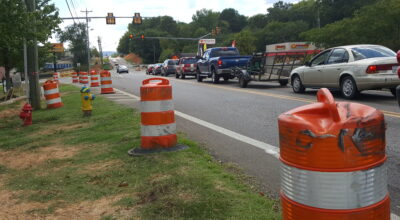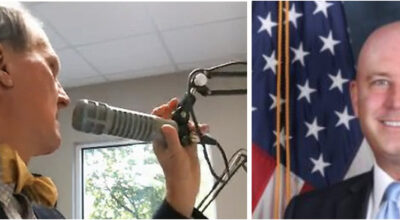
CHATTANOOGA, Tenn., June 19, 2023 — Automated license plate readers are active in Hamilton County, in Chattanooga and in Soddy-Daisy, a small town where I have a house north of the city.
By David Tulis / NoogaRadio Network
Given that LPR’s are being rolled out in police and deputy cruisers in large numbers I’m considering my situation as a person asserting the right to travel and communicate on the public right of way in a car bearing a machine-readable tax tag, aka “license plate.”

Matt Lea, sheriff’s department spokesman, refuses press inquiry about the use of this federally funded equipment. Rather, the department is tooting its horn about having the most attractive and winning police cruisers, even sending an officer up top of Lookout Mountain for a “Best Looking Cruiser Contest for Tennessee” photo shoot.
This right is an ancient one of communication and is in service of all our other constitutional guaranteed rights such as religion, press, assembly or bearing arms. These rights also are an estate inherited by citizens from the land itself, arising out of land and operating on the roads that are the people’s trust, serviced by state and local government.
Right now I am going down the road in a 2000 Honda Odyssey minivan with a valid tax stamp tag that is proof of registration, but a car and person without an insurance policy required under state and federal law for all those involved in commercial use of the road. I am not — repeat, I am not — in commercial ue.
I don’t have insurance on the van because I’m not using the road for commerce. I use it only for personal necessities and ordinary exigencies of human life, which use faces a soon oppression.

A report this morning in The Chattanooga Times Free Press explains the arrival of this technology that would appear to obviate the need for the officer to have probable cause in affecting an arrest. Generally, a cop has to have probable cause to bring about an arrest.
Every “traffic stops” which are in arrest under law. For purposes of the 4th amendment, when the blue lights go on atop a police cruiser against a traveler in a car, that is an arrest. “Similarly, it has been deemed reasonable to temporarily seize an automobile and occupants for investigation in the absence of probable cause if a police officer has reasonable suspicion, based on specific and articulable facts, that the occupants have been involved in or are about to be involved in criminal activity.” State v. Gonzalez, 52 S.W.3d 90, 98 (Tenn. Crim. App. 2000). This case is a “did not use an indicator light before making turn” criminal case, and says a traffic stop is an arrest for 4th amendment purposes.
A person “may not be detained even momentarily without reasonable, objective grounds for doing so; and his refusal to listen or answer does not, without more, furnish those grounds. If there is no detention—no seizure within the meaning of the Fourth Amendment—then no constitutional rights have been infringed.” Id. Gonzalez at 96.
Under LPR, the officer at the evidentiary hearing can say that he did not have probable cause to stop me because he didn’t need it. The reason is that the LPR with a digital eye scans all license plates on all cars and provides immediate feedback as to the owner, the owner’s status, whether the owner is wanted for a crime, whether the owner is on a watch list, whether the owner has a suspended license, or has the allegedly requisite insurance.
The officer has all this data in hand and immediately gets digital heads up about the plate has set off the alarm.
As to my prospective criminal case, however, or yours, question: Does the officer have the car and have me in mind before he pushed the “ON” button to activate the LPR? If he didn’t have me in mind based on an articulable suspicion, to finally reach me, he doesn’t have probable cause in arresting me by pulling me over even though the LPR flags my car.
My arrest, no doubt, will be without a warrant, even though the alleged offense is not a “public offense” requiring a warrant, pursuant to T.C.A. § 49-7-103. I am suing the chief justice, Roger Page, and others in federal court in Nashville to get this law upheld.
If we don’t understand the abuse by cops and deputies against us in commercial traffic enforcement, we will not have means to resist them when they bring worse upon us, such harms pending.


The question is, “Will the People speak up yet?” Or, will they accept that Tennessee is just destined to be ruled by a foreign jurisdiction?